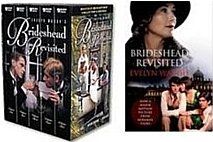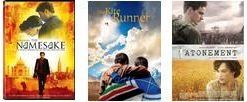Blog Home ▼

 I revisited Brideshead again last week—rereading the book after 25 years—because something about the newest film didn't sit right.
I revisited Brideshead again last week—rereading the book after 25 years—because something about the newest film didn't sit right.
There’s also the 1981 version with Jeremy Irons, the sumputuous mini-series that clocks in at 11 hours. Why remake a perfectly fine wheel? Well, after my marathon reread, I’m even more curious.
I actually like the new 2008 version, primarily because of the performances. They’re terrific! But the two-hour format distorts the storyline and the work’s ultimate meaning.
The biggest problem is the timing of Julia and Charles’s love affair. In the book, the two don’t fall in love until they meet onboard the ship—10 years after they first met at Brideshead. The new film has them fall in love early on—at Brideshead. It’s a serious misreading because it leads to the premise that Sebastian’s unrequited love for Charles is what sucks him into a self-destructive vortex. His decline is far more complicated—and goes to the heart of the book.
The story appears, on the surface at least, to be critical of religion, certainly Catholicism. But the book’s chapter titles provide a real tip-off: “Et In Arcadia Ego” and “The Twitch Upon the Thread.” The novel has to do with the operation of divine grace in the world:
an invisible line which is long enough to let [ the unrepentant ] wander to the ends of the world and still bring him back with a twitch upon the thread.
Willful disobedience gets both Charles and Sebastian thrown out of Arcadia—the paradise / Eden that was Brideshead during the summer of 1923. Only after suffering and disillusionment do the two feel the “twitch upon the thread”—even Charles does at the novel’s end, though it’s unclear whether he’s actually reeled in.
For Book Clubs
Why not revisit Brideshead by reading Waugh...then seeing the 2008 film version? Or for real die-hards watch the 11-hour 1981 version! Choose a weekend—and pack a sleeping bag and pillow! Invite me, too.
 Slough—a great word, and one that’s kept me running to the dictionary over the years. The problem is, it has 4 different pronunciations . . . along with 6 different meanings, and I can never keep them straight. Slough is the perfect example of a heteronym.
Slough—a great word, and one that’s kept me running to the dictionary over the years. The problem is, it has 4 different pronunciations . . . along with 6 different meanings, and I can never keep them straight. Slough is the perfect example of a heteronym.
Don’t You Just ♥ Words?
Slough — when it sounds like . . .
slow,
is a morass or swamp or . . .
despair (as in Bunyan’s Pilgrim’s Progress)slew,
is a sluice or drainage ditchSl-how . . . (or slouch, minus ch)
is a town near Liverpool, Englandsluff,
is a skin (as in snake)
and a verb: to discard, throw off—Okay, see how quickly
you can get through this—He decided, that poor snake, in a slough of despond to slough off his slough in the slough near the slough outside Slough.
Here’s what it sounds like…
He decided, that poor snake, in a slow of despond to sluff off his sluff in the slew near the slow outside Sl-how
Well...it's how I spend my days. How do you spend yours? Got any cool words? Please join in the fun by leaving us a comment.
 Another book? Philip Roth is 75! Why doesn’t he schlep himself off to Florida, put his feet up, and collect his royalties?
Another book? Philip Roth is 75! Why doesn’t he schlep himself off to Florida, put his feet up, and collect his royalties?
It would be the decent thing to do—it’s what the rest of us would do.
Noooooo...... he’s still plugging away, churning out one superb book after another. His latest is Indignation. “Enough already,” as Portnoy’s mother would say.
I’ve come to Roth late, and now I’m wondering why I deprived myself for so long. If you haven’t read him, run to the nearest library or bookstore. Yes, he can be long-winded, over-the-top, tasteless, and self-absorbed, but he’s also brilliantly inventive, side-splittingly funny, and a dazzling storytelller. Oh, and sexually explicit (hilariously explicit, if you’re up for that...if you’re not, please beware).
Where to start? I can’t direct you, but here’s an outline of his oeuvre:
Philip Roth
- Portnoy’s Complaint—a Jewish man-child’s coming-of-age. (The funniest book ever written.)
- The “Zuckerman novels”—9 in all. In the first 4 (referred to as “Zuckerman Bound”) Nathan Zuckerman, author of the outrageous Carnovsky and stand-in for Roth and Portnoy’s Complaint, is the protagonist. In the last 5, an older Zuckerman observes more than participates in the stories he tells.
- The “Kepesh trilogy”—3 novels that revolve around David Kepesh, an insecure and sexually fixated literature professor.
- The “Roth novels”—3 semi-autiobiographical (or not) novels.
- Other novels—another 9—include Goodbye, Columbus; Letting Go; When She Was Good; Our Gang; The Great American Novel; My Life As a Man; Sabbath’s Theater; Everyman; and the most recent, Indignation.
- Oh, yes—another novel is in the works, The Humbling, due out in 2009.
- Non-fiction and short stories—had I mentioned that?
Also head to SCREEN THOUGHTS with Hollister and O'Toole to listen to the podcast review of the 2016 Sundance film version of, Indignation. (The review starts at point 11:04 after a tribute to famed writer-director-producer Garry Marshall.)
Where do critics stand? He’s been called “the single best writer of fiction of the past 25 years.” * And while all critics have their Roth favorites, most seem to agree that the following are his best (click on titles to see our Reading Guides):
- Portnoy’s Complaint (1969)
- Zuckerman Bound (1979-85)
- Operation Shylock (1993) – Roth Novel
- American Pastoral (1997) – Zuckerman Novel
- The Human Stain (2000) – Zuckerman Novel
- The Plot Against America (2004) – Roth Novel
- Sabbath’s Theater (2005)
- Everyman (2006)
- Exit Ghost (2007) – Zuckerman Novel
* A.O. Scott. “In Search of the Best.” New York Times Book Review , 5/21/2006.
 My 3rd post* on Josh Henkin’s excellent essay about book clubs. Henkin (author of Matrimony) speaks with book groups all over the country, and here’s what he would like to see happen when we talk about books:
My 3rd post* on Josh Henkin’s excellent essay about book clubs. Henkin (author of Matrimony) speaks with book groups all over the country, and here’s what he would like to see happen when we talk about books:
- Less discussion about which characters are likable: (Think of all the great literature populated by unlikable characters.)
- Less of a wish for happy endings: (Nothing is more depressing than a happy ending that feels tacked on, and there can be great comfort in literature that doesn’t admit to easy solutions, just as our lives don’t.)
- Less of a wish that novels make arguments: (The business of the novelist is to tell a story and to make characters come sufficiently to life that they feel as real to the reader as the actual people in their lives.)
Books on the Brain, April, 29, 2008
Dear reader, we’re up a creek. Henkin’s points are well-taken, but since we’re not professional critics, and if we shouldn’t talk about characters, endings, or themes—then what do we talk about when talking about books, especially when it’s our turn to lead the discussion? (Me? Lead the discussion? Please, I’d rather have the flu.)
If it’s high anxiety for you at your book club—give the discussion resources a try on our main website. You may find they help.
• Reading Guides for specific titles and discussion questions.
• Discussion Tips
• Generic Questions for Fiction and Nonfiction
• Read-Think-Talk —a guided-reading chart.
• LitCourse—our 10 short, free online courses.
See all my posts on Josh Henkin’s book club essay:
 English—what a great language to have fun with! Below are homophones, words that sound alike but have different meanings. (And, yes, I’ve taken a few liberties.)
English—what a great language to have fun with! Below are homophones, words that sound alike but have different meanings. (And, yes, I’ve taken a few liberties.)
Don’t You Just ♥ Words?
want | wantin’ | wanton | wont | wonton
My wont isn’t wantin’ to be wanton —
I just want a wonton. Want one?Translation:
I’m not usually fresh; I’m just reaching over you for a fried wonton.
These are mine. See if you can find others . . . or come up with your own. This is good exercise for the brain—so feel free to play along!
 Back to Joshua Henkin—this is my 2nd post devoted to his terrific essay about book clubs. Henkin, author of Matrimony (now in paperback), speaks with book groups around the country. Here’s a question he raises:
Back to Joshua Henkin—this is my 2nd post devoted to his terrific essay about book clubs. Henkin, author of Matrimony (now in paperback), speaks with book groups around the country. Here’s a question he raises:
Where are all the men? . . . My experience has been that women read fiction and men read biographies of civil war heroes. And women join book groups and men don’t. Yet those few co-ed book groups I’ve attended have been among the most interesting. And if, as seems to be the case, book groups have led to an increase in reading in a culture that otherwise is reading less and less, it would be nice to see more men get in on the act.
Books on the Brain, April 29, 2008
Henkin is right: I read somewhere that 75-80% of book clubbers are women—why is that figure so lopsided? Why do women join book clubs and men don't? And for those few co-ed clubs to which Henkin refers, are the reading lists different from all-women clubs? (See my later post on this very subject—Do Real men join book clubs?—11/7/08.)
Questions for Book Clubs
1. For women’s clubs: do you ever consider inviting men to join your club?
2. How do you think adding men might change your book choices and discussions?
3. Same questions for all-men clubs, too. I know there are a few all-male clubs out there.
See my three other posts based on Joshua Henkin’s book club essay:
1. Book Clubs—smarter than critics?
2. I Laughed! I Cried! — how do we talk about books?
3. Echo Chambers—are we all reading the same books?
 Am I the only person in the US who hasn’t seen Mama Mia? Probably. I’m so late on the uptake. Worse, yesterday I finally got around to seeing The Namesake, based on Jhumpa Lahiri’s novel. Better late than never.
Am I the only person in the US who hasn’t seen Mama Mia? Probably. I’m so late on the uptake. Worse, yesterday I finally got around to seeing The Namesake, based on Jhumpa Lahiri’s novel. Better late than never.
Sometimes a movie is just better than its book. I liked Lahairi’s novel. But I think (at least for now) she’s a better writer of short stories, which is actually a harder craft. (Faulkner claimed short stories to be more difficult than poetry.)
Namesake, The Film is terrific. By nature, it lacks the book’s interiority (and therefore some of its depth and insights), but that may be why I liked the movie’s characters better, particularly Gogol, who isn’t as alienated or self-absorbed as he is in the novel. Granted, the movie doesn’t capture Ashima Ganguli’s isloation from American culture as well as the book, nor her dismay at losing her children to its influence. But I just think the film holds together better. (See our Reading Guide for The Namesake.)
On the to The Kite Runner. Beloved as the book is, it has some structural problems, especially toward the end when Ahmed meets his nemisis 15 years later in Afghanistan. That whole section felt tacked on, manipulative, over-the-top. Again, the film version was better, somehow managing to handle the rescue section with more elegance and power. Same with the final kite flying scene on the California beach. (See our Reading Guide for The Kite Runner.)
And finally Atonement. Wow to both book and film. But I like the film’s ending better than the book’s. The whole birthday party scene (with Briony’s secretiveness about her to-be-published-book and the bad buys sitting right there) feels contrived. But Vanessa Redgrave’s beautifully modulated monologue somehow lent the film more credibility and power, to say nothing of stature. It took my breath away. (See our Reading Guide for Atonement.)
Book Club Questions
- What books have you read that also have film versions? Which did you prefer?
- Does your club show film clips during discussions? Do you talk about a book vs. film version?
 An intriguing blog post by Joshua Henkin, author of Matrimony, raises some interesting issues about book clubs. I’m using only a brief excerpt here, but there’s so much more to his article that I plan to refer to it in future posts.
An intriguing blog post by Joshua Henkin, author of Matrimony, raises some interesting issues about book clubs. I’m using only a brief excerpt here, but there’s so much more to his article that I plan to refer to it in future posts.
Henkin speaks with book clubs around the country, and here’s what he says about the many clubs he’s talked with:
From coast to coast and in between, I’ve found a huge number of careful readers . . . who have noticed things about my novel that I myself hadn’t noticed, who have asked me questions that challenge me, and who have helped me think about my novel (and the next novel I’m working on) in ways that are immensely helpful. I’ve certainly learned more from book groups than from the critics, not because book group members are smarter than the critics (though often they are!), but because . . . they bring to the enterprise a great degree of passion. —Books on the Brain, April 28, 2008.
Be still my heart! Henkin’s experience refutes a disheartening blog discussion I came across a while back. The blogger and her guest were disparaging Oprah and her book selections, as well as the entire book club movement—because they didn’t meet certain standards of literary sophistication (apparently, their standards). Ouch.
Well, I love Josh Henkin’s remarks—they certainly put that ugly assertion to rest. Yea, Josh!!
See my later posts on Joshua Henkin’s book club essay:
 Has your book club read any chick-lit? If so, is there enough meat, or gum, for a good discussion?
Has your book club read any chick-lit? If so, is there enough meat, or gum, for a good discussion?
What is chick-lit? Think young urban women obsessed with men, sex, possessions, travel, and partying. Think Sex in the City, All We Ever Wanted Was Everything, or Chasing Harry Winston.
The title of a recent New York Times article, “On the Beach, Under a Tiffany Blue Sky,” situates chick-lit smack in the middle of a beach towel—as escapist summer reading.
Beach reading or not, you can imagine older feminists yanking at the bottoms of their bathing suits in disdain. Is this what all the fuss was about—so daughters could end up as boy-crazy, status-seeking materialists?
But maybe chick-lit is more serious? Maybe it’s a reaction against the earnestness of the previous generation. Here’s author Melissa Banks in a 1999 Salon interview:
The women of my [younger] generation were brought up to think of themselves in terms of what they did rather than of being married or unmarried, and it took on this huge weight. Work was suddenly supposed to be a much bigger thing than work can ever be. You’re supposed to give your soul to it—and ... to be as dedicated to your work as you would be to another person.
Questions for book clubs:
- Is chick-lit a rebellion: “not-your-mother’s-feminism”? Or is it a second-generation taunt at men: ”Anything-you-can-do-I-can-do-better”? (If men can take charge of their own sexuality, careers, dreams and desires, why can’t women?)
- Should chick-lit be taken with a grain of salt (or sand)? Or does it offer an interesting insight into a post-feminist era.
 English—what a great language to have fun with! Below is a set of homophones, words that sound alike but have different meanings and often different spellings.
English—what a great language to have fun with! Below is a set of homophones, words that sound alike but have different meanings and often different spellings.
Don’t You Just ♥ Words?
peak | peek | peke | pique
He kicked her peke out of pique when she took a
quick peek before it could peak.Translation:
He kicked her dog in anger when she checked the oven
to see if his, uh...souffle had risen.
Okay. I came up with these. Let us know if you can you find others . . . or come up with some of your own. Leave a comment.
Site by BOOM
![]()
LitLovers © 2024
